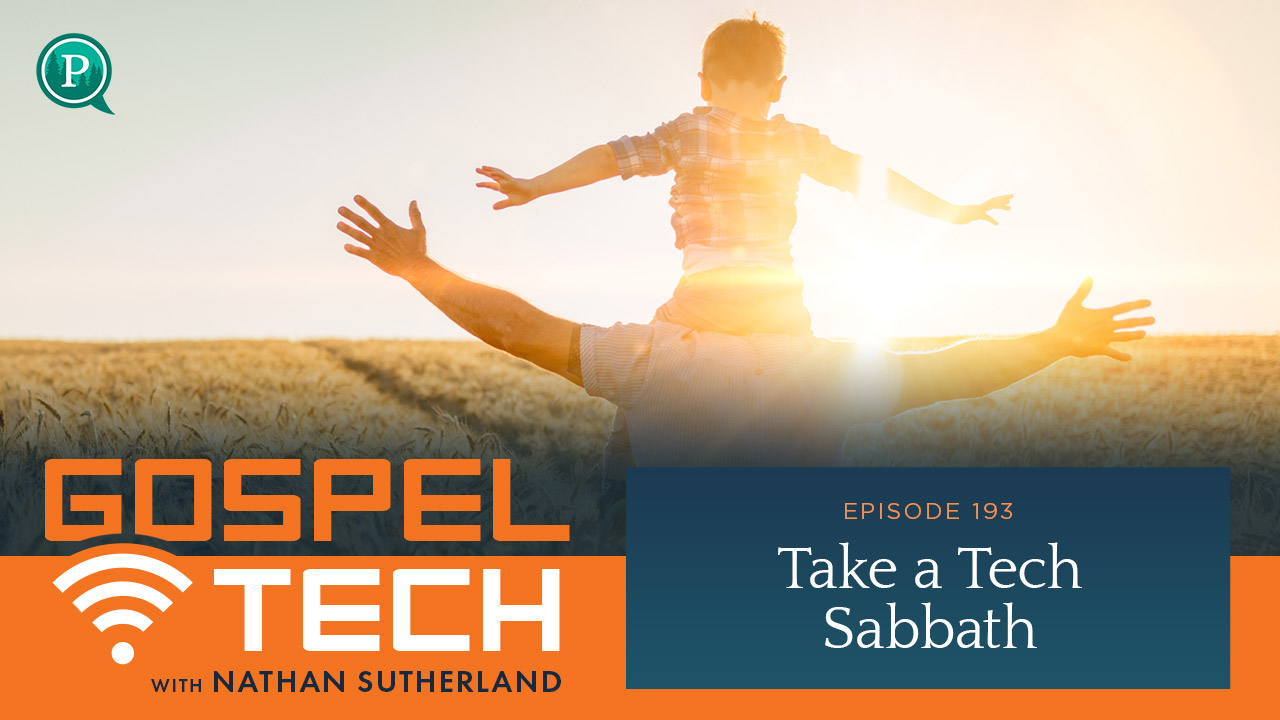Sabbath is a gift. It’s not a rule meant to ruin our fun, it’s a present we are to open and enjoy. But how do we sabbath in a tech world? Today we talk about the three ways we can practice sabbath with our tech and begin to enjoy the rest and presence of God even in our daily tech lives.
Show Notes:
- Exodus 20: God tells us to take a sabbath
- Mark 2: Jesus tells us that sabbath was made for us (a gift), not us for a sabbath (a rule to help us impress God)
So in light of that we need to:
- Slow down – Take stock of what you’re doing for three days. “The Life We’re Looking For” by Andy Crouch
- Unplug – pick 1 tech to stop for a sabbath
- Abide (based on John 15:5): read, pray, sing, discuss, and be intentionally present
Ways to listen:
🔗 click the link in the profile
🎧 search Gospel Tech in your favorite streaming service (iTunes, Amazon)
Transcription:
Nathan Sutherland:
Hello everyone, and welcome to the Gospel Tech Podcast. My name is Nathan Sutherland, and this podcast is dedicated to helping families love God and use tech. Today, we are hot off the heels of a conversation about how we can take a tech break. It was looking at the big picture of how do we assess when tech is unhealthy and then what can we do, and that taking tech away can be loving. It isn’t punitive. It doesn’t have to be the hammer used to motivate your child. Instead, it could be a way you raise your child up in the way they should go to simply say, “Child, I love you,” and this isn’t healthy right now. You asked for an egg, I gave you a scorpion. It’s no longer good. Maybe it was good a month ago, it’s not good anymore. Today, I want to talk about, all right, and I’m workshopping the wording even as we’re talking about this because it’s written down as a practical Tech Sabbath.
How do we do that? But when we say Sabbath, that sounds very religious, and I don’t mean that in a bad way, but a lot of people feel like, “Well, okay, but that’s for the rule followers, and I’m saved by grace, so I don’t need a Sabbath.” And I understand that we’re not talking about salvation today. We’re talking about how do we practically apply this idea of taking a tech break. It’s a Tech Sabbath, and so I also had titled it Just Get More Rest, which I like as a working title, but that felt kind of judgy, and as my friend Brian put it, it shoulds on you. It says something you should do but doesn’t really empower you to do the thing.
So practical tech Sabbath, I think, is a nice happy medium for our conversation. How do we apply this tech break, not just as a disciplinary action but as a spiritual discipline, as something I want to do because I love Jesus, not because I’m worried that he’s going to be mad at me if I don’t, or that somehow I’m going to mess up my kids if I don’t, or somehow I have to pull all the metaphysical levers of the universe so that life goes good for me. That’s not what we’re trying to do. We’re not trying to trick God into giving us good things, as we’ll see today, Christ came to give us life and to give us it abundantly.
We are not having to wrestle good things out of the hands of God. That is something we need to put to rest. Right now, we are trying to see the goodness that God has prepared for us to do and for us to participate in, and that God’s plans are the good plans. His will is the goodwill, and anything that extends from that is good, and anything that distracts from it is bad. That’s what we’re trying to talk about. So when we take a Sabbath, we’re trying to make space to hear from and follow God. How do we do that? Well, that’s today’s conversation. I hope it’s encouraging because it’s something I’m actively walking through. And so, with no further ado, let’s get this conversation started.
Welcome to the Gospel Tech Podcast, a resource for parents who feel overwhelmed and outpaced as they raise healthy youth in a tech world. As an educator, parent, and tech user, I want to equip parents with the tools, resources, and confidence they need to raise kids who love God and use tech.
Thank you to everyone who’s helped make this podcast possible. Thank you for listening, for sharing, for liking, for subscribing. If you’ve listened to this, would you please leave a rating and a review wherever you listen. So Apple Podcasts, for example, you scroll to the bottom, those would be five-star options, and then you could leave a sentence or two. They’re encouraging for me because I love to know how we’re helping or how we can improve, and they’re super helpful for other people finding this resource. We’ve seen growth here again. As school year starts, people start looking for answers, and that’s when those search results matter, and we pop up higher when people search gospel, see people search, technology, addiction, help, smartphones, all that stuff. We pop up higher thanks to your reviews. It’s a major weight in how the algorithms work and find itself. So thanks for doing that.
Today, we are talking about that practical tech Sabbath. God spoke, saying these words. Exodus 21, I am the Lord who brought you out. One, in verse three, you shall have no other gods. Two, make no graven images, no carved images. Three, do not bow down or serve them, for I’m the Lord. Excuse me. So three is do not take the Lord’s name in vain. Four, remember the Sabbath day and keep it holy. Six days, you shall labor. Do all your work. On the seventh is a day of Sabbath to the Lord your God. So this is a biblical observation. Now, before we get too far down this and say get the two sides, one side. See, we have to do this if we love God, otherwise, we don’t truly love him. So this becomes a salvation issue. Or on the other side, I’m saved by grace. I don’t need any Sabbath. I’m going seven days a week, 365 until my heart explodes.
Okay, let’s just take a deep breath and recognize that this is true. This isn’t the Bible, and the Bible is the inert word of God. This isn’t a mistake. This is one of the 10 commandments, and well, we don’t have murder now acceptable because of grace. So we shouldn’t think that this has somehow been lightened. There is important weight to this, and it’s even explained there. It’s returned to with further explanation, such as in Mark chapter 2 when Jesus heals a guy on the Sabbath and the teachers of the law go, “Aha, it’s one of the 10 commandments. It’s one of the laws we were given by God and you broke it. You did work on the Sabbath.” And Jesus lovingly points out the Sabbath was made for man, not man for the Sabbath. Mark 2:27.
All right, so we have this. We know that it is one of the 10 commandments, and this matters to God. The Sabbath is important, and we know that it’s made for man, that it’s a blessing, it’s a gift from God. John Piper puts it this way, the Sabbath is a sign. It points us to a truth that we are never to forget. The truth is that God and not we ourselves, has sanctified us. So he goes on to cite Exodus. When the Lord commands Moses, say to the people, “You shall keep my Sabbath, for this is a sign between you and me throughout your generation. So you may know that the Lord sanctify you.” Exodus 31:12-13 is what he’s quoting there. That’s a beautiful reminder. Sabbath is not a rule to be kept. So God will love me. It’s a reminder. It’s like praying.
It’s a reminder. I pray to commune with God, yes, to hear from God certainly, but it’s an act of submission. It’s an act of faith. Can an all-knowing, all-powerful God operate without me praying? Yes. Why am I told then by Jesus to pray, and not only just to pray, but he teaches us how to pray. The Lord’s prayer is our formula, our model, and it’s our Father who is in heaven. We both recognize the relationship, and then the relationship, the interpersonal relationship of the personal being of God, the father and us, and the relationship in order who is in heaven. And I’m not right. So we immediately start with submission and recognizing where I am in light of God. Well, prayer is a thing that we do because we believe God listens and God answers it. Therefore, for me, praying is an act of faith, not trying to earn God’s favor.
Sabbath is an act of faith. God gave it to me as a blessing. I was made, or excuse me, the Fat Sabbath was made for me as a blessing. It’s a good thing. I need to set that out first and foremost because it isn’t a new rule. It’s not a gauge of your value as a child of God any more than taking a vacation as a gauge, as your value as an employee, right? Or accepting a Christmas gift is a gauge of the value of your child. It’s a gift. Accept it. It’s a blessing. So let’s see it for what it is. Sabbath is rest. It’s not doing nothing, and it’s not doing just what we like. So it’s not when I go and play my favorite game or watch my favorite movie or go watch sports or attend a tournament for my kids.
Those aren’t necessarily rest. Are they valuable? Very possibly assuming you’re being prayerful and intentional with your time and content, sure, but that’s not Sabbath. Sabbath is really specific. When we talk about taking rest, what we’re trying to do is make space really to delight in the Lord and to remember his promises. So if we were to do three things, it would be to slow down to lower the rapidity of our lives. We have so much just going on in our lives, average American just, “How are you doing?” “Good, but I’m busy,” but I’m busy is like the catchall for why I’m not sleeping and why I snapped at my kids and why I haven’t fixed that health issue I’ve got going on and why and why and why and why I haven’t called that person back and I’m not discipling anyone. I’m not reading my Bible. We throw, but I’m busy because, well, I am good. I think if I stopped to reflect on it, maybe I wouldn’t be good. Maybe I’m not okay being alone. Maybe I’m not okay.
Maybe I’m not okay with quiet spaces, I don’t know, but I’m going to say good, but I’m busy. So that’s our catchall, and we need to slow down and address that stuff. I love the book Andy Crouch’s newer book. I referenced Andy Crouch’s Tech-Wise Family a lot, but he wrote a book The Life We’re Looking For, and there’s this great spot where he cites Wendell Berry referencing the difference between a path and a road and that a path is made by someone repeatedly walking it. And it’s just the way people have walked for a long time. And so you walk the path, and in Proverbs, and in Psalms, and in Jesus himself referencing, I’m the way, I’m the path, we have this idea that it’s a way that’s been walked. And when it referenced, it works well with the metaphor of sheep as well, because shepherds would walk a path, and they would lead the way, and the sheep will follow them. They’re not driven down the path they’re followed.
And then, when you compare that to a road, Andy Crouch’s words are, the road is imposed on the landscape by tools and technology. Paths are worn over time and repetition, and roads are driven into the landscape for efficiency and power because you can get more stuff there faster. And it’s not that that’s bad, but that the intention is different and the way it got there is different. And when we talk about following Christ, we want to go slower on purpose, not necessarily all the time. I’m not going to tell you to be inefficient, but there is this idea, if you think of it as like a tithe for your time, if we’re expected to tithe our money and you are expected to tithe your money, your first fruits, we see it all the way back with Cain and Abel.
The first fruits are given to the Lord well before a temple, well before the law, well before anything else. First fruits are given, and we see that repeated throughout the Bible. It’s a heart action, it’s an act of worship, it’s an act of trust. Give your money. And I personally find it harder to give my time. I wish I had a clear answer, for it’s still something I’m processing. Part of it is, I’m in a ministry. So just speaking for my own life, the reason I don’t like going slow is because I feel like I’m not doing enough. But that’s not the standard for ministry, that’s not the standard for parenting. That’s not the standard for being a good Christian. Jesus says in John 15:5 that we are to abide in him the vine and that when we do, that’s when we bear good fruit, that actually doing less might be doing more on a spiritual level as well as a physical level, that God isn’t impressed by our overworking and by our busyness.
So the first part of taking a tech Sabbath is to get us to slow down. The second is to get us to unplug, and this is for the less connectivity, less connectivity to all the things that we use in our kingdom of self. And by that, I am trying to use a term that will encompass all the ways I look for hope in technology rather than using it from hope. So we have these three with the slowdown part of slowing down and doing less, as to reference Andy Crouch, again, he has a beautiful image of this idea of technology as either an instrument or a device. Devices leverage our power. So I use tool and drill tech, this idea that tool tech helps you create and drill tech helps you consume. And he would actually, even within tool tech, would then break it down again and say, “Okay, there absolutely is tool tech, but what is this tool helping you do?”
We have tools. And he would say, “Okay, but some of those tools are actually instruments.” They’re creative and beautiful, and they extend the joy. You come away more whole because you were part of the creative process, and some of them are devices, and they’re just there to smash it and flatten it, and pave it, that it’s just meant to be a tool to help you do things more efficiently. Email would be an example he would point out in the tech world versus or email or text, or versus something like on the instrument side, like literal instruments to play music or instruments that we use to create beautiful things. So that same computer making images, or making stories or making even games, things that people can engage in and because you’re passionate about it, not because it necessarily brings efficiency or income. So when we do less, I think that this is a beautiful spot for us to pause and say, “What am I doing? We can’t do less if we don’t know what we’re doing. We need to actually write it out.”
If it just comes down to writing it out one day, do it. Write down one day of what you are doing, from when you wake up to when you go to bed, in 15-minute increments. Write it in a note, write it on a physical piece of paper, put it on a sticky note if you need, just get it down. I would encourage you to do it for a couple days. I did it for a three-day stint on a workday because every once in a while you’re like, “Well, that was a weird day because of A, B, or C, fine.” But let’s see, a couple days, do three. Don’t have to do a month, but write it down as you go. I did it retroactively because of the way my brain works.
Meaning every time I finished a task or my workday, I jumped into a note on my computer and I just typed in when I… so I kept doing when I started, so 8:00 AM, I was like, 8:00 AM, starting this writing project, and then I worked in 25 fives. Thank you, Justin, pay you for that. But I would stop me, okay, doing another chunk now of this writing project, or nope, taking a break to go do this other thing. I’m going to go walk around the house for 10 minutes, and I would as I entered each new thing, would just type it in after I finished the last one. Does that make sense? So if I’m starting 10-minute of walk to clear my brain, I’d write, “Hey, I just finished 30 minutes of writing,” and that was just a log of what I have done, not what I am doing.
So when I got distracted and oh my goodness, do I get distracted? I’ll be like, “I filed for 12 minutes.” Don’t know why I found myself putting things in files. I found myself watching a really random video that I went to my YouTube to upload another video for gospel tech and found myself watching a super random cycling video and like, “Okay, all right,” but I’m writing it down. I need to see it so that at the end of the day I can say, “Hey, here’s how much time I saw my kids. Here’s how much time I engaged the Lord in his word here, how much time I applied that.” Just reading God’s word isn’t our only goal. I want to do it.
And how much time did I actually spend applying what I read today about whatever you’re reading? I’m reading out of Psalms, and it’s how am I praising the Lord? How am I worshiping? Did I make time for that, or when I was doing my work, was I doing it in a worshipful way, or was I just motivated by paying my bills or getting this done, or just simply annoyed that I had to do it at all? What was my heart? That’s what this is to help us do because we can’t slow down until we know what we do. So make a list of what you do. Do it with your spouse, do it with your kids, do it with accountability partner or someone from your small group, but write out what you’re doing and then pray about that. “Lord, this is what my day looks like. Am I doing this right? My time is limited, my days are numbered, and I want to use them to your glory.”
That’s what we’re trying to do when we slow down, is really, as the psalmist prays, “Lord, teach us the number of our days that we might have a heart of wisdom.” This idea that we’re much more careful with what we do when we realize it’s a finite resource and there’s nothing more finite than time, folks. Second thing is unplug. So now that we know how we use our time, we need to know what tech we use. Yes, write it all down and say, “Is it tool tech or is it drool tech?” Just make, this is a great thing to do with your little kiddos. “Hey, what tech do we have in our house?” And have everybody write it all down. And it could be calculators and MP3 players and speakers and TVs, and computers. Write it all down, and then write some of it as a tool and drool. You can break that down, and hey, we use it for this activity. That activity is tool. This activity is drool. Break it down and know what you’re using, and understand that it is entirely reasonable to say that’s not a net gain.
We have that tech, we don’t need it. The number one, one I hear from people right now is their TVs. So many people are looking at cutting the TV cord and just being like, “I don’t know, can we do that? Do we need to do that? Is it important?” Great question for your family. Talk about it. Is the TV a net gain for your family? We had a young man over last night, and he was hanging out with my boys, and Turner is like, “Can we watch a show?” I was like, “Hey, we’re not going to do that right now. We do watch shows, but right now we’re hanging out.” And he’s like, “Yeah, you guys don’t even have a TV.” I was like, “It’s true.” Technically, we have four TVs because we have a bunch of work laptops, but you’re right, we don’t have one on a wall.
That’s true. And that a young man visiting noticed that it is noticeable, which is why we did it. We’re like, “Hey, we still want TV in our lives.” I’ve hadley watched a show yesterday. That is part of what we do. But you’re right, you can’t see one. The idea of a tech Sabbath, is now we know how to slow down and we know what we’re going to do deliberately, and we know what we’re going to leave out. I strongly recommend on your Sabbath, picking one thing that’s a regular part of your six day a week and dropping it. Don’t start with all your tech. Don’t go cold Turkey. I’m not going to say don’t. I’m going to say, “Don’t expect yourself to do that.” I do believe a deliberate change. I know there are those people who say you can’t make little changes, you can’t just dial tech back.
It’s too pervasive, it’s too engaging. I actually think that’s part of the point. I don’t believe you will feel the urgency of this call for a tech Sabbath if you haven’t tried, if you’ve never realized just how deep those hooks are in your brain and behavior. So pick one text, say, “I’m not going to play games this Sunday or Saturday or Monday, whatever Sabbath you get where you make a deliberate day of intentionally worshiping the Lord and being relational and being less engaged by distraction. So first we’re going to write down what we do so we know how to slow down. We’re going to pick our activities for this day, then we’re going to pick our technology. And rather than just picking the one or two we’re going to use, write down all your tech and say, “This is the one we’re not going to use today.”
We’re going to set it aside and we’re going to see what happens to our hearts and to our behaviors. Maybe it’s amazing. You go, you know what? We want to do that more often. We’re going to make sure that that tech goes away every time we come home or every afternoon, or whatever your rhythm will be. That’s great. But it might be that you go, wow, I actually don’t know how to function. Can society work without this piece of technology for even just a 24-hour period? That’s what I’m trying to get into, because when you have that realization, the answer is yes, society will function without it. Pick one and drop it. And our family, obviously the TV was one, the smartphone is one that I try, guys, and it’s really hard. My brain starts making up. This is what I see. I see my brain start making up excuses being like, “All right,” but I do wonder that one thing, and well, that information’s only on my phone.
I don’t need to Google it. I just need to check this one note. I got to have it so that I can finish this project. How many feet again is that trim I’m supposed to be doing? “Oh, it’s on my phone. I got to go get my phone.” And, of course, once I’m on there, I’m knee deep in responding to text messages, and I don’t have social media on my phone. It’s just text messages and general distractions with all these work-project things. That’s unplugging, and that’s an area where my heart needs to be addressed because it’s not bad. But I made a commitment to not look at this today, and now I’m finding excuses to look at it. And that’s what we want to deal with. The next thing is, we’re going to actively practice abiding in Christ. This is the point of the Sabbath is that we are abiding in God and that we’re going to connect to him.
The Bible gives us lots of examples, but reading scripture together is one of those. And this can be intimidating. It doesn’t have to be, I’m intimidated by this a lot. I don’t want to bore my children and give them a bad taste in their mouth. So that’s the first excuse I use. And the second excuse is, I want to make sure it’s something I know, and then I end up giving a sermon, and they’re bored, and it leaves a bad taste in their mouth. So what works best is going in as curious learners together and read a piece of scripture. I really like the Gospel of John or the Psalms. The Psalms because they’re beautiful and they give us lots of imagery. And as a literature teacher with Anna in my house as a language arts teacher myself, I love the allegory and the metaphor, and the figurative language of Psalms because it helps us see how language adds power and how that’s happened for thousands of years in human history.
That’s regular and normal. Rather than just showing someone a picture, we help them engage it with other pictures to see how good God is, that he is like a mother bird gathering us under his wing, that he’s like a good shepherd, that he’s like a rock, that he’s like a fortress, that he’s like a mighty warrior, that he’s like all these other things, that he’s like a father, right? That is a metaphor to describe our God. There aren’t other gods described by that. And if they are, they’re really vindictive, horrible fathers. They’re not all the good traits of a father. So we read together, read something simple, read it short, and apply it. And again, if you want supplemental materials, we use the new city catechism. Anna has been doing an awesome job because it’s an app you can download for free. It’s 52 basically statements of biblical truth is what the new city catechism is.
You can listen to it. It’s these songs that little kids sing, and it’s like, “How and why did God create us? He created this male and female in his own image to glorify him.” That’s effectively it. But they just repeated a bunch. Your kids will learn this, they’ll soak it up. They don’t know all the truth behind that. But the point is, it’s true. And there’s always a scriptural reference for it. So it’s not just true because someone experienced it, it’s true because it’s in the Bible. And now let’s build our experiences on top of that. Let’s use this to interpret the reality we live in. So reading together, supplements like the new city Catechism can help you do that if you’re not comfortable reading the Bible out loud together, okay? Praying together can be simple, but more than just for your meal, say a prayer, pray for a neighbor, pray for a loved one. Go through the Lord’s prayer.
Our Father, who is in heaven, holy in your name. Your kingdom come, your will be done on earth as it is in heaven. Give us this day our daily bread, and forgive us our trespasses as we forgive those who trespassed against us. It’s a beautiful prayer that breaks down both what we should ask and the order in which we ask it. Try it. Try it with just your spouse, and then try it with your kids. Try it with your roommate. If you’re single, try it with your small group, a classmate. It is prayer, and it’s not just a dogmatic exercise. It’s a lovely repetition and tradition, and Jesus gave it to us. We want to take it for what that is, not oversimplify, but also not overcomplicated.
Sing together. Worship is a massive thing. David worships so, so well. And we have the Psalms as examples of that, but we are to sing a new song. So you’re okay singing something other than the salter. I love the salter, I love the hymns. And there are songs that are biblically true. You can also choose today, maybe just skip the ones that sing more about you than Jesus. Then you can discuss it with your community. Whatever you are practicing from this Sabbath, whatever came up, be honest. I need to be able to share with people like, “Hey, I tried to quit tech and here’s what happened. Can you help me pray through this or talk through this? And not to fix it, but just to bring it up before the Lord.” Because again, most of this is a heart issue.
And then finally applying it. We are trying to not just do better, but actually pray. “Lord, what would you have me do before I just go and give anything up?” This idea of when the apostles were sent out, what happened every time when an apostle, when Paul and Barnabas were sent out, what do we see? Well, we see prayer and we see fasting, and we see intentional seeking of the Lord, even though we know that the Lord’s will is to go and make disciples. No one has a question about that. We know we’re to do three things. Love God, our heart, soul, mind, and strength. Love our neighbors ourself, including washing the feet of our enemies, as Jesus shows us in John 13. And we’re to make disciples, help other people do those first two things. So they’re not wondering like, “God, do you want us to make disciples? Should we send Paul out to go into these other cities and proclaim the gospel?” No, that’s not the question. The question is, is this the time? Is that the place? Are these the people?
And that’s what we want to know with our technology. Our sabbaths are meant to be places to recharge us spiritually, to reconnect us to the vine, and to redirect our path. So when we go and walk the path set before us, that Jesus is lovingly calling us down. Make sure it’s not just, A-good path, but it’s B-path. And that’s what the Sabbath is for. The Sabbath is his chance for us to experience a little bit of eternity, a little bit of that unplug, a little bit of that refresh, that reminder that the Lord leads us to good pasture, that he leads us beside still waters, and he restores our souls. So my encouragement today to you and my reminder to myself is, “Oh my goodness, we need to get more rest.” But since I said it at the beginning, that’s kind of the shame version of it. Let’s think about how we can take a practical tech Sabbath. Let’s do those three things. First, let’s assess how we spend our time and figure out how can I slow down.
What do I need to choose? Not just what do I need to delete, but what do I need to choose in my life and make a priority on this one day, a family meal, a family time, a family activity, a family prayer, a family reading. How can I just once? And it could be a total of 30 minutes of activity in that way, but what am I going to do deliberately? Not just, what am I going to not do? What am I going to unplug? This is the one thing I’m going to not do. I could undo everything and just pick the one thing I will do. And if you’re ready for that, please do it. It’s awesome. Go for it. But I am concerned that we will either get overconfident that we’re so awesome because we don’t do all these things. And that’s not the point.
The point isn’t not do things. The point is only do the things that are drawing us closer and building us up in Christ, which brings to third abide in Christ. And there are deliberate biblical and historical ways, disciplines that we can do, like reading scripture together and praying together and singing together and discussing what we’re learning and wrestling with together, and applying God’s word to, well, prayerful, seeking for his will, knowing there’s a path, knowing one, we’re already walking it, but making sure that we’re humbly walking that and not just saying, I’ve got it from here. God, I saw your will one time, and now I’m going to take off. I hope that that’s encouraging and that it feels practical, that those three things are three things you can do this week. Talk to one of your family members about what could we do this week to choose a day to slow down.
What one tech could our family agree to give up for one day? Not because we’re mad at it, not because we’re trying to move out beyond cell service because they’re fewer and fewer places now exist where that’s true. And then third, and finally is, how can we abide today? What practice can we put in place to rest in the Lord and make sure that his word is getting inside us, but it’s also coming out of us that we’re getting a chance to practice it with one another, with our neighbors, and with those who don’t yet know him?
So if you have any questions about this, would you please reach out to me, [email protected], or you can find us on social media at Love God Use Tech on Instagram and Facebook. You can check out those same resources that I just referenced for upcoming talks. October will be busy. November is going to be exciting. And if you want Gospel Tech to speak at your church or school, or organization, go to gospeltech.net and check out speaking. And then, please, would you share this with someone? If it was helpful for you, would you say, “Hey, I listened to an encouraging podcast. Check it out.” And then join us next week as we continue this conversation about how we can love God and use tech.
Follow this podcast:







